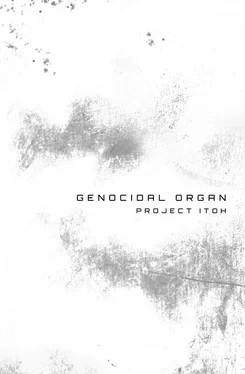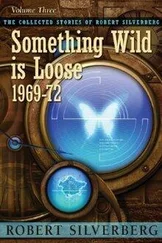Project Itoh - Genocidal Organ
Здесь есть возможность читать онлайн «Project Itoh - Genocidal Organ» весь текст электронной книги совершенно бесплатно (целиком полную версию без сокращений). В некоторых случаях можно слушать аудио, скачать через торрент в формате fb2 и присутствует краткое содержание. Год выпуска: 2012, ISBN: 2012, Издательство: Haikasoru/VIZ Media, Жанр: Старинная литература, на английском языке. Описание произведения, (предисловие) а так же отзывы посетителей доступны на портале библиотеки ЛибКат.
- Название:Genocidal Organ
- Автор:
- Издательство:Haikasoru/VIZ Media
- Жанр:
- Год:2012
- ISBN:9781421550886
- Рейтинг книги:4 / 5. Голосов: 1
-
Избранное:Добавить в избранное
- Отзывы:
-
Ваша оценка:
- 80
- 1
- 2
- 3
- 4
- 5
Genocidal Organ: краткое содержание, описание и аннотация
Предлагаем к чтению аннотацию, описание, краткое содержание или предисловие (зависит от того, что написал сам автор книги «Genocidal Organ»). Если вы не нашли необходимую информацию о книге — напишите в комментариях, мы постараемся отыскать её.
Genocidal Organ — читать онлайн бесплатно полную книгу (весь текст) целиком
Ниже представлен текст книги, разбитый по страницам. Система сохранения места последней прочитанной страницы, позволяет с удобством читать онлайн бесплатно книгу «Genocidal Organ», без необходимости каждый раз заново искать на чём Вы остановились. Поставьте закладку, и сможете в любой момент перейти на страницу, на которой закончили чтение.
Интервал:
Закладка:
So I told Lucia I was interested in seeing Kafka’s grave and asked if she would act as my guide to Prague. Given how widespread alternative reality contacts were these days, it was a bit of a risky move—why would anyone need a human guide when you had all the tourist information you could ever want at the blink of an eye, literally? But after some hesitation, Lucia assented, and so I ended up taking the metro with Lucia to the outskirts of the city where the New Jewish Cemetery was located.
The cemetery was covered in a canopy of lush foliage that seemed to block off what little of the pale sunlight managed to creep through the amber clouds in the sky.
There were a few other visitors to Kafka’s grave. They were leaving pebble stones as an offering, as was the Czech custom.
“Kafka’s sisters?” I asked, pointing at the gilded lettering that had been added at the bottom of the gravestone, where three feminine-sounding names had been inscribed.
“I believe so.”
“They all died around the same time too. 1942, 1943—ah …”
“Yes, Auschwitz.” Lucia nodded. “They all died in the Holocaust. Even his youngest sister, Ottla. She had married a German, but she divorced him to voluntarily move to the Ghetto. Ottla’s husband tried to stop her from divorcing him. As the wife of an Aryan, she was eligible to have her Jewish status overlooked. Still, she chose to go. She left their daughter with him.”
I never knew that, I told her, although she explained that it was quite widely known—common knowledge in Prague, at least. Franz, the eldest of the Kafkas, was most fond of the youngest, Ottla.
“Well, I take my hat off to you, Ms. Lucia—you sure do know your Kafka.”
“Well, my Holocaust more than my Kafka. John used to talk about it all the time.”
“John? Oh, you mean the gentleman that you used to see?” I maintained my facade of barely remembering his details.
Lucia nodded. “John was always discussing the Holocaust. It must have been the subject of his research. It’s not as if he were actually Jewish himself …”
“You said he was involved in a DARPA research project, right? Studying history? That’s unusual.”
“Well, I never knew the details. Say, Mr. Bishop, you seem awfully interested all of a sudden.”
“Not particularly,” I assured her, covering my tracks as deftly as I could. “It just struck me as somewhat incongruous, that’s all, the US Army spending their time and money researching a well-worn subject such as the Holocaust. I would have thought they’d want to spend their time on more practical things, like, I don’t know, robots, or artificial intelligence, or high-tech polymers or something.”
“When you put it like that, I suppose you’re right,” said Lucia. “But it wasn’t just the Holocaust he was interested in. He also talked about Stalin a lot. And Cambodia. Sudan, Rwanda, places like that too. His research always seemed to be focused around all the cruelest episodes in recent history.”
“Okay, so the Holocaust was just a part of that.”
“Yes, I think so.”
Lucia and I left a pebble each as an offering to the Kafkas. For Franz and his three sisters. Unlike Franz, his sisters had only the years of their deaths inscribed, not the actual dates. These were unknown, as with so many Jews who met their fate during the Holocaust. The Holocaust was such an all-encompassing word that the details were soon swallowed up in the dark depths of history.
“But we do know exactly when they were transported to the concentration camps. Those records survive,” Lucia told me in a voice so soft it was almost a whisper. “It’s like with us—whenever we move, take the metro, buy some food, or ride a tram, there’s always a record.”
“I guess so. And I guess, like with Sarajevo and New York, it’s not just to act as a deterrent to terrorists but to quickly and accurately identify any victims if the terrorists succeed. Killing two birds with one stone, you might say: preventative measures and help with the mop-up if the worst ever does happen.”
Lucia smiled. “Mr. Bishop, you almost sound like you’re lecturing me. But you don’t need to convince me. Don’t worry, you’re preaching to the converted. I don’t particularly feel that Big Brother is watching us in a totalitarian Orwellian nightmare.” She laughed. “But while we’re on the subject of historical lectures, what I will say, though, is that the government at the time didn’t have anywhere near as clear a picture of their own citizens as they made out. No database or central records. They were basically relying on a ten-year-old national census. So how did they record, analyze, sort, and compile effective records of who actually was and wasn’t Jewish? Punch cards. The operation to transport Jews to the concentration camps was the largest coordinated transport effort in human history at the time. The Nazis could only do this by generating and tabulating data on punch cards, based on the results of the old census. They used IBM machines to organize all of this. IBM hadn’t invented the modern PC yet, of course, but they did have tabulators that they called ‘computing machines’ that were already being used for industrial purposes, and it was relatively straightforward for the Nazis to set these up for their own purposes.”
“So you’re saying that without IBM’s … tabulators, the Nazis would never have been able to organize the mass transit of Jews to the concentration camps?” I asked, as if I were reviewing information for a quiz. “Well, they say that the modern computer was born out of cryptanalysis and grew up on ballistics. It looks like the computer’s ancestors can’t escape the shadow of war either.”
“John showed me one once. A transportation schedule for the Jews, tabulated by IBM. John’s actual research was top secret, but the schedules themselves were open source, so I guess he didn’t see any harm in it.”
“Hmm. I’m getting a mental image of a couple snuggling down on a couch to spend the evening poring over Holocaust memorabilia. Not exactly your usual dinner and a movie, eh?”
“I guess not. We were an odd couple, that’s for sure.” Lucia laughed. “He often used to say that genocide had a unique odor about it.”
“Odor?”
“According to him, the Holocaust, Katyn Forest, and the killing fields of the Khmer Rouge all had a lingering scent about them. Whenever there was some sort of genocide—a deliberate, large-scale massacre—that country always had this distinct odor about it.”
The smell of genocide.
John Paul must have come across this theory in the course of his historical research.
“Presumably he wasn’t talking literally about the smell of dead bodies?”
“No, I don’t think so. I guess he was using poetic license. Maybe he was trying to discuss a discovery he made during the course of his research without actually having to compromise any of the secret details.”
“And so you never really found out what exactly his research was about …”
“Yes. I don’t think he told anybody. He had a small team around him doing some of the legwork, but I think he did most of the heavy lifting himself. I don’t think he even discussed his work with his wife.”
“His wife. Oh. Uh … so you were … uh …” It was never an easy job, trying to seem surprised by information that you already knew full well. I gave it my best shot.
“Yes,” Lucia said, “he had a wife. And a daughter. I knew about them both. You must think I’m the worst sort of woman …” Lucia trailed off and then turned away from me and started walking toward the metro station alone.
I hurried after her. “Um … look … Ms. Sukrova. I’m really sorry, I was prying. None of this is any of my business, and I had no right …”
Читать дальшеИнтервал:
Закладка:
Похожие книги на «Genocidal Organ»
Представляем Вашему вниманию похожие книги на «Genocidal Organ» списком для выбора. Мы отобрали схожую по названию и смыслу литературу в надежде предоставить читателям больше вариантов отыскать новые, интересные, ещё непрочитанные произведения.
Обсуждение, отзывы о книге «Genocidal Organ» и просто собственные мнения читателей. Оставьте ваши комментарии, напишите, что Вы думаете о произведении, его смысле или главных героях. Укажите что конкретно понравилось, а что нет, и почему Вы так считаете.












